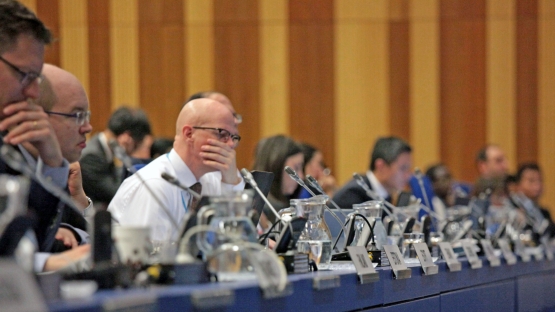Affirming continued exchange of information as a means to strengthen emergency preparedness and response (EPR) arrangements, representatives from Competent Authorities under the Convention on Early Notification of a Nuclear Accident and the Convention on Assistance in the Case of a Nuclear Accident or Radiological Emergency met last week in Vienna. Competent Authorities are designated by state parties to the above-mentioned conventions to carry out specific functions related to nuclear and radiological emergencies.
The 170 representatives from 85 Member States and two international organizations took part in the meeting and discussed the implementation of the conventions, as well as global information exchange, international assistance and public communication techniques, among other topics.
The Competent Authorities meet biennially to discuss lessons learned and share experiences and challenges from further enhancing EPR systems.
In his opening address, IAEA Deputy Director General Juan Carlos Lentijo, Head of the Department of Nuclear Safety and Security, said the cooperation of the kind fostered by the meeting helped ensure that national and international EPR capabilities and arrangements were efficient and ready to provide effective responses to nuclear and radiological emergencies.
Meeting Chair Khammar Mrabit, Director General of the Moroccan Agency on Nuclear and Radiological Safety and Security, stressed the importance of the IAEA Incident and Emergency Centre in promoting the international EPR framework. He highlighted the Centre’s role in establishing relevant safety standards and proving for their application through fostering information exchange and offering the Emergency Preparedness Review Service and training. “Many challenges faced by each Member State are common challenges that we must work on together,” Mrabit said.
Meeting participants, noting the importance of regular emergency exercises to improve response arrangements and capabilities, shared results of national exercises and encouraged each other to invite the IAEA and neighbouring States to participate in their national emergency response exercises. Lessons learned from a large IAEA international exercise simulating the global emergency response to a nuclear power plant accident, held in 2017, were presented.
Meeting participants also stressed how planning communication is crucial to ensure its effectiveness during an emergency. Discussions included the different public communication needs for countries with nuclear power plants and those without. The increasing role of social media in an effective public communication programme was highlighted. The participants also welcomed the strengthening of IAEA EPR tools including the Unified System for Information Exchange in Incidents and Emergencies (USIE), International Radiation Monitoring Information System (IRMIS) and the Emergency Preparedness and Response Information Management System (EPRIMS).
Participants recognized the importance of harmonizing national and regional preparedness arrangements at the preparedness stage. They took note of the importance of utilizing GSR Part 7 as a key reference for harmonization.




